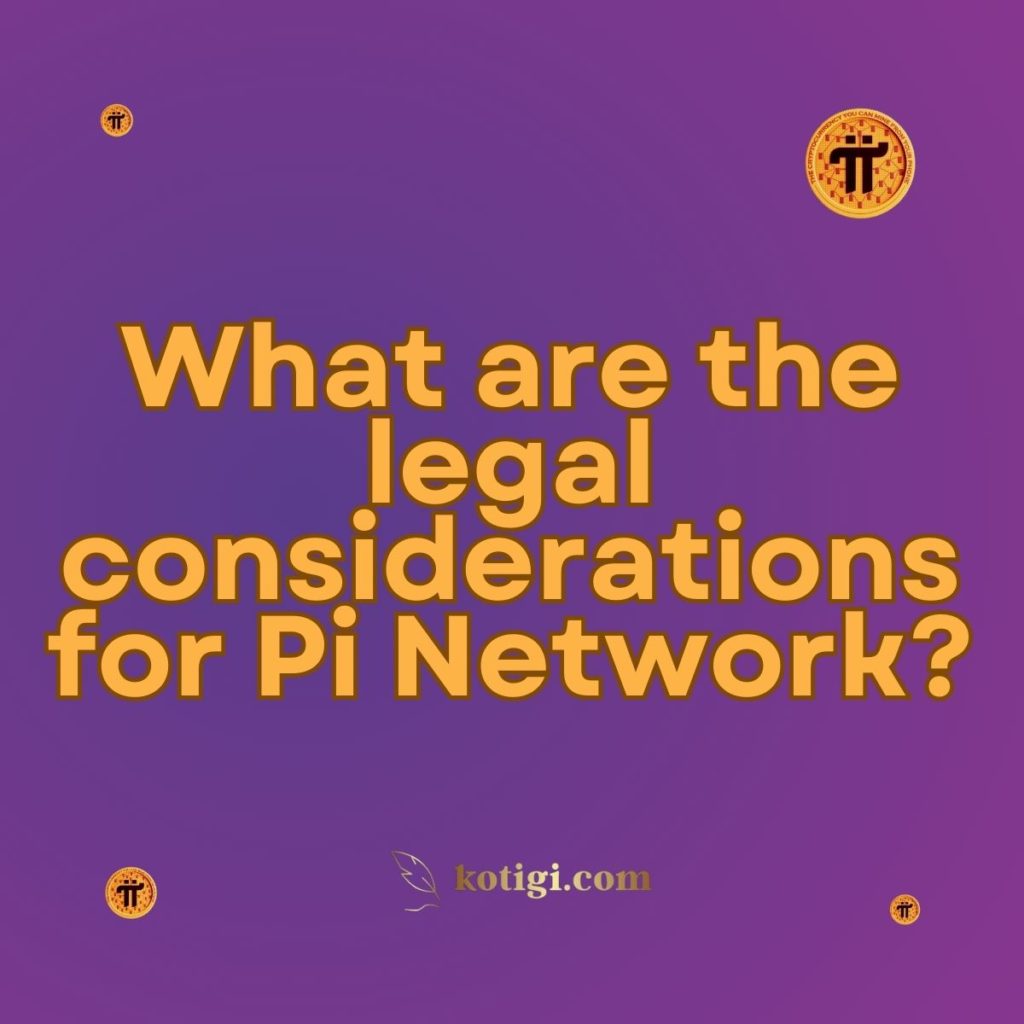
What are the legal considerations for Pi Network?
The legal considerations for Pi Network revolve around regulatory compliance, user data protection, and adherence to cryptocurrency laws in various jurisdictions. As a decentralized network that seeks global adoption, Pi Network must navigate complex legal frameworks, including those related to securities, anti-money laundering (AML) regulations, and consumer protection laws. While Pi Network is still in its early phases, its legal status will become increasingly critical as it transitions from a testnet to a fully operational mainnet, ensuring its compliance with global financial regulations.
Introduction
As the Pi Network grows in popularity and moves closer to launching its mainnet, legal considerations become a crucial factor in its continued success. Operating a decentralized cryptocurrency network in a global landscape involves navigating various legal frameworks and regulatory requirements. These considerations are essential to ensure the platform remains compliant, secure, and accessible to users across different jurisdictions.
In this article, we’ll explore the key legal considerations Pi Network must address, from complying with securities laws to protecting user data and ensuring transparency. As cryptocurrencies continue to evolve in a highly regulated environment, Pi Network’s approach to legal issues will play a pivotal role in its long-term sustainability.
Navigating Cryptocurrency Regulations
Securities Classification
One of the most critical legal challenges Pi Network faces is determining whether its cryptocurrency is classified as a security. In many countries, including the United States, the legal classification of cryptocurrencies depends on the Howey Test, which assesses whether a transaction qualifies as an investment contract. If Pi is deemed a security, the network will have to comply with specific securities regulations, which may include registration and reporting requirements with regulatory bodies like the U.S. Securities and Exchange Commission (SEC).
The classification of Pi is likely to influence how it is adopted and traded. Pi Network must ensure it is not in violation of securities laws as it progresses from its testnet phase to a fully operational cryptocurrency.
Global Regulatory Landscape
Pi Network operates in a global environment, which means it must comply with the regulatory frameworks of various countries. Cryptocurrency regulations differ widely across jurisdictions, with some countries embracing digital assets and others imposing stringent restrictions or outright bans.
To achieve mass adoption, Pi Network will need to remain agile and adaptable to changes in regulatory environments. This may include working closely with legal experts and government bodies to ensure that the network operates within the boundaries of local laws while maintaining its decentralized ethos.
Anti-Money Laundering (AML) Compliance
As with any cryptocurrency, Pi Network must implement robust anti-money laundering (AML) measures to prevent illicit activities such as money laundering and terrorist financing. Compliance with AML regulations is especially important as Pi transitions to the mainnet, where the cryptocurrency will have real-world value and utility.
Pi Network will likely need to work with regulators and financial institutions to establish Know Your Customer (KYC) protocols and other safeguards to prevent illegal activity. Ensuring AML compliance will help build trust among users, businesses, and governments, facilitating smoother integration into the global financial ecosystem.
Ensuring Data Privacy and Protection
User Data Security
With millions of users already participating in the Pi Network, safeguarding user data is a top priority. Pi Network collects personal information from its users during the registration and KYC processes, making it crucial to comply with global data protection regulations such as the General Data Protection Regulation (GDPR) in Europe and the California Consumer Privacy Act (CCPA) in the United States.
Failure to adhere to these data protection laws could lead to significant legal repercussions, including fines and reputational damage. Pi Network must ensure that its data handling practices are secure, transparent, and compliant with all relevant regulations to protect user privacy and avoid legal disputes.
Decentralization and Data Governance
Pi Network’s decentralized structure presents unique challenges in data governance. Unlike centralized platforms, where data control lies with a single entity, decentralized networks require a different approach to managing and protecting user information. Ensuring that the network’s decentralized governance model complies with data protection laws is a complex task that requires careful consideration.
The platform will need to implement protocols that allow for transparency and user control over personal data while maintaining the decentralized nature of the network. This will be particularly important as Pi transitions to its mainnet phase, where greater regulatory scrutiny is expected.
Compliance with Tax Laws
Taxation of Cryptocurrency Earnings
As Pi Network users begin to accumulate Pi coins, taxation will become a significant legal consideration. In many jurisdictions, cryptocurrencies are treated as taxable assets, meaning that users will be required to report any earnings from Pi as part of their income. This could include mining rewards, staking profits, or capital gains from trading Pi.
Pi Network will need to provide users with clear guidelines on how to report their cryptocurrency earnings to tax authorities, as failure to comply with tax laws could result in penalties. Additionally, the network may need to establish relationships with tax authorities to ensure that transactions conducted on the platform are transparent and compliant with local tax regulations.
Tax Implications for Businesses
Businesses that accept Pi as a form of payment will also need to consider the tax implications of using cryptocurrency. In many cases, businesses will need to report their earnings in Pi as taxable income, and the value of Pi at the time of the transaction will need to be recorded. Pi Network will likely need to provide educational resources for businesses on how to comply with tax laws when accepting cryptocurrency as payment.
For both individual users and businesses, the ability to navigate cryptocurrency taxation will be a key factor in Pi Network’s legal compliance and broader adoption.
Intellectual Property and Licensing
Protecting the Pi Network Brand
As Pi Network grows in popularity, protecting its intellectual property becomes increasingly important. This includes securing trademarks for the Pi Network name, logo, and any other identifying marks associated with the platform. Intellectual property protection will help Pi Network prevent unauthorized use of its brand and maintain control over its public image.
Additionally, ensuring that any technology or software developed by Pi Network is properly patented or licensed is crucial to safeguarding the platform’s innovations. Intellectual property disputes can be costly and time-consuming, so taking proactive steps to protect Pi Network’s intellectual property will be essential for its long-term success.
Open Source and Licensing Considerations
Pi Network may choose to release parts of its codebase as open-source software, allowing developers to contribute to the platform’s growth and innovation. However, releasing open-source software comes with its own set of legal considerations, particularly when it comes to licensing agreements.
Pi Network must ensure that any open-source software is properly licensed to avoid potential legal disputes over intellectual property rights. This will involve selecting appropriate licenses that protect Pi Network’s interests while fostering innovation and collaboration within the developer community.
Legal Considerations for Validators
Validator Requirements and Compliance
Pi Network’s decentralized structure relies on validators to secure the network and confirm transactions. Validators must meet certain requirements to participate in the network, including completing KYC verification and adhering to Pi Network’s rules and guidelines. Legal considerations arise when enforcing these rules, especially if validators are located in different jurisdictions with varying laws.
Ensuring that validators comply with Pi Network’s legal obligations, such as data protection and AML laws, is essential for maintaining the network’s integrity and security. Pi Network may need to establish legal frameworks to manage validator participation and resolve disputes that may arise between validators and the platform.
Liability and Legal Accountability
As validators play a critical role in maintaining the network, questions around liability and legal accountability will likely emerge. For example, if a validator fails to follow the network’s rules or engages in fraudulent activity, who is held responsible? Pi Network must establish clear legal guidelines around validator responsibilities and potential liabilities to ensure that the network operates smoothly and within the bounds of the law.
Conclusion
Pi Network’s legal considerations are wide-ranging and essential to the platform’s success as it moves toward mass adoption. From navigating complex cryptocurrency regulations to ensuring data privacy and intellectual property protection, Pi Network must remain vigilant in addressing the legal challenges that come with operating a decentralized network. Compliance with global financial regulations, securities laws, and tax requirements will be key to fostering trust among users, businesses, and regulatory bodies alike.
By proactively addressing these legal considerations, Pi Network can solidify its position as a legitimate and compliant cryptocurrency platform that is poised for long-term success.
Key Takeaways
- Securities Classification: Pi Network must navigate securities laws to determine whether its cryptocurrency is classified as a security, which could impact its legal obligations.
- Data Privacy Compliance: The platform must comply with global data protection regulations, such as GDPR and CCPA, to safeguard user data and maintain trust.
- Tax Compliance: Users and businesses participating in Pi Network must adhere to tax laws, including reporting cryptocurrency earnings and transactions.
- Intellectual Property Protection: Pi Network should secure trademarks and patents to protect its brand and technological innovations.
- Validator Legal Obligations: Validators must comply with Pi Network’s legal requirements, including KYC verification and AML regulations, to maintain the network’s security and integrity.

